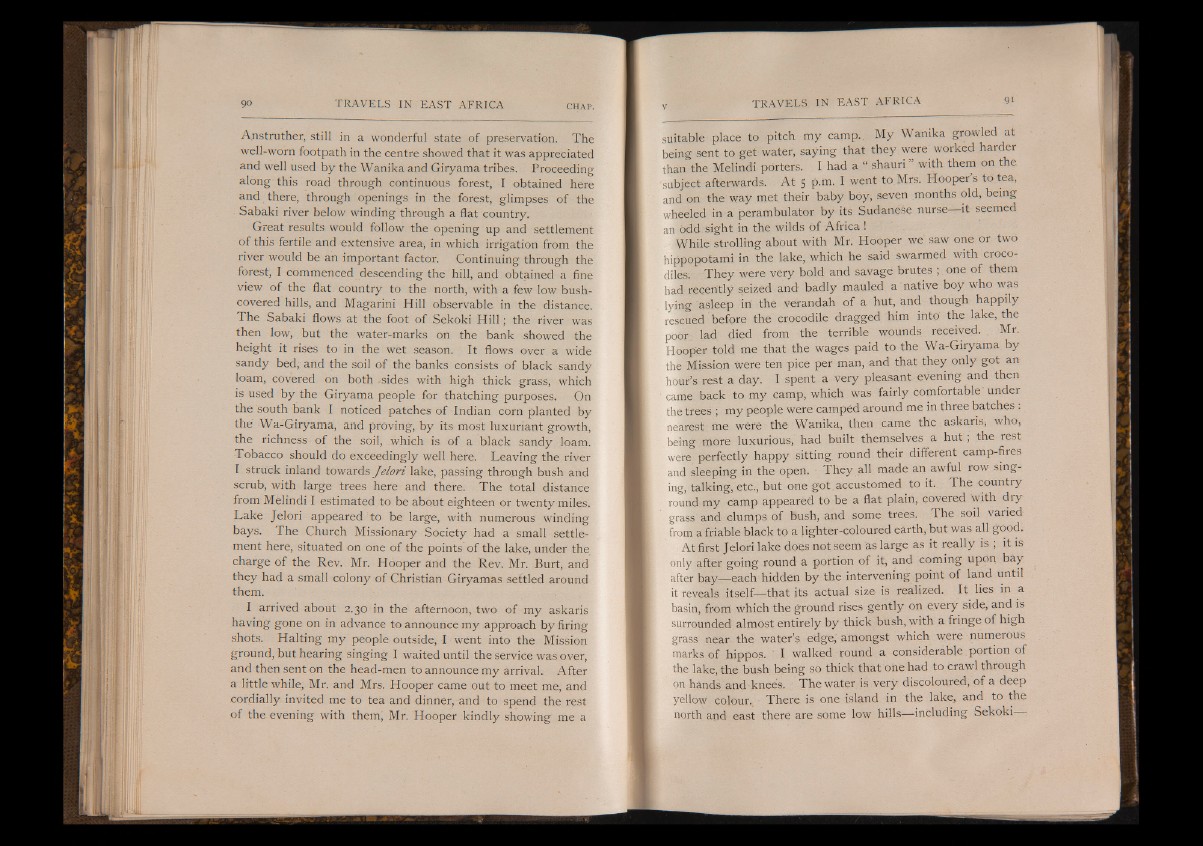
A.nstruther, still in a wonderful state of preservation. The
well-worn footpath in the centre showed that it was appreciated
and well used by the Wanika and Giryama tribes. Proceeding
along this road through continuous forest, I obtained here
and there, through openings in the forest, glimpses of the
Sabaki river below winding through a flat country.
Great results would follow the opening up and settlement
of this fertile and extensive area, in which irrigation from the
river would be an important factor. Continuing through the
forest, I commenced descending the hill, and obtained a fine
view of the flat country to the north, with a few low bush-
covered hills, and Magarini Hill observable in the distance.
The Sabaki flows at the foot of Sekoki H ill; the river was
then low, but the water-marks on the bank showed the
height it rises to in the wet season. It flows over a wide
sandy bed, and the soil of the banks consists of black sandy
loam, covered on both .sides with high thick grass, which
is used by the Giryama people for thatching purposes. On
the south bank I noticed patches of Indian corn planted by
the Wa-Giryama, and proving, by its most luxuriant growth,
the richness of the soil, which is of a black sandy loam.
Tobacco should do exceedingly well here. Leaving the river
I struck inland towards Jelori lake, passing through bush and
scrub, with large trees here and there. The total distance
from Melindi I estimated to be about eighteen or twenty miles.
Lake Jelori appeared to be large, with numerous winding
bays. The Church Missionary Society had a small settlement
here, situated on one of the points of the lake, under the
charge of the Rev. Mr. Hooper and the Rev. Mr. Burt, and
they had a small colony of Christian Giryamas settled around
them.
I arrived about 2.30 in the afternoon, two of my askaris
having gone on in advance to announce my approach by firing
shots. Halting my people outside, I went into the Mission
ground, but hearing singing I waited until the service was over,
and then sent on the head-men to announce my arrival. After
a little while, Mr. and Mrs. Hooper came out to meet me, and
cordially invited me to tea and dinner, and to spend the rest
of the evening with them, Mr. Hooper kindly showing me a
suitable place to pitch my camp.. My Wanika growled at
being sent to get water, saying that they were^ worked harder
than the Melindi porters. I had a “ shauri ” with them on the
subject afterwards. At 5 p.m. I went to Mrs. Hooper s to tea,
and on the way met their baby boy, seven months old, being
wheeled in a perambulator by its Sudanese nurse— it seemed
an odd sight in the wilds of Africa !
While strolling about with Mr. Hooper we saw one or two
hippopotami in the lake, which he said swarmed with crocodiles;
They were very bold and savage brutes ; one of them
had recently seized and badly mauled a native boy who was
lying asleep in the verandah of a hut, and though happily
rescued before the crocodile dragged him into the lake, the
poor; lad died from the terrible wounds received. , Mr.
Hooper told me that the wages paid to the Wa-Giryama by
the Mission were ten pice per man, and that they only got an
hour’s rest a day. I spent a very pleasant evening and then
came back to my camp, which was fairly comfortable under
the trees ; my people were camped around me in three batches :
nearest me were the Wanika, then came the askaris, who,
being more luxurious, had built themselves a h u t ; the rest
were perfectly happy sitting, round their different camp-fires
and sleeping in the open. They all made an awful row singing,
Talking, etc., but one got accustomed to it. The country
round my camp appeared to be a flat plain, covered with dry
grass and clumps of bush, and some trees. The soil varied
from a friable black to a lighter-coloured earth, but was all good.
At first Jelori lake does not seem as large as it really is , it is
only after going round a portion of it, and coming upon bay
after bay— each hidden by the intervening point of land until
it reveals itself— that its actual size is realized. It lies in a
basin, frorri which the ground rises gently on every side, and is
surrounded almost entirely by thick bush, with a fringe of high
grass near the water’s edge, amongst which were numerous
marks of hippos. ' I walked round a considerable portion of
the lake, the bush being so thick that one had to crawl through
on hands and knees. The water is very discoloured, of a deep
yellow colour. There is one island in the lake, and to the
north and east there are some low hills:—-including Sekoki :